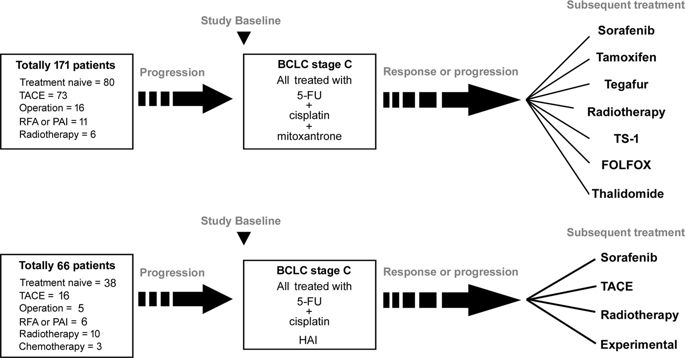当前位置:
X-MOL 学术
›
Pharmacogenomics J.
›
论文详情
Our official English website, www.x-mol.net, welcomes your
feedback! (Note: you will need to create a separate account there.)
A GALNT14 rs9679162 genotype-guided therapeutic strategy for advanced hepatocellular carcinoma: systemic or hepatic arterial infusion chemotherapy.
The Pharmacogenomics Journal ( IF 2.9 ) Pub Date : 2019-10-14 , DOI: 10.1038/s41397-019-0106-0 Chen-Chun Lin , Chao-Wei Hsu , Yi-Cheng Chen , Ming-Ling Chang , Kung-Hao Liang , Ming-Wei Lai , Chih-Lang Lin , Rong-Nan Chien , Kwang-Huei Lin , Chau-Ting Yeh
The Pharmacogenomics Journal ( IF 2.9 ) Pub Date : 2019-10-14 , DOI: 10.1038/s41397-019-0106-0 Chen-Chun Lin , Chao-Wei Hsu , Yi-Cheng Chen , Ming-Ling Chang , Kung-Hao Liang , Ming-Wei Lai , Chih-Lang Lin , Rong-Nan Chien , Kwang-Huei Lin , Chau-Ting Yeh

|
Although targeted agents are recommended as the first-line treatments for advanced hepatocellular carcinoma (aHCC), systemic chemotherapy or hepatic arterial infusion chemotherapy (HAIC) are still being used in Asian countries. Beside economic considerations, it was found that targeted drugs could not significantly prolong overall survival in aHCC patients with distant metastasis. In addition, chemotherapy could achieve complete response in a small proportion of patients. Here, we aimed to investigate whether combination of three previously identified single nucleotide polymorphism (SNP) predictors (GALNT14-rs9679162, WWOX-rs13338697, and rs6025211) could guide our choice between systemic chemotherapy, HAIC, and targeted agents in aHCC patients. A cohort of 237 real-world aHCC patients (171 receiving systemic chemotherapy followed by various anticancer treatments including sorafenib; 66 receiving HAIC) were included for outcome analysis. By combining the three SNP markers with or without addition of two clinical criteria (tumor diameter <8 cm, neutrophils <80%), small groups of patients were found to harbor high complete response rates to systemic chemotherapy (35.3% if the 3-SNP signature alone matched; 60.0% if clinical criteria also matched). Subsequent sorafenib treatment for chemotherapy non-responders was associated with longer overall survival (P < 0.001). In HAIC-treated patients, GALNT14-rs9679162 genotype "GG" was associated with longer overall survival (P = 0.019, median survival > 10.5 months). In conclusion, pre-test for the 3-SNP signature in aHCC patients could identify potential systemic chemotherapy or HAIC responders. Chemotherapy non-responders still benefited from subsequent sorafenib treatment. Accordingly, we propose a roadmap for aHCC patients when chemotherapy or HAIC is to be used.
中文翻译:

GALNT14 rs9679162 基因型指导的晚期肝细胞癌治疗策略:全身或肝动脉灌注化疗。
尽管靶向药物被推荐为晚期肝细胞癌 (aHCC) 的一线治疗方法,但亚洲国家仍在使用全身化疗或肝动脉灌注化疗 (HAIC)。除了经济方面的考虑,发现靶向药物不能显着延长远处转移的 aHCC 患者的总生存期。此外,化疗可以在一小部分患者中达到完全缓解。在这里,我们旨在研究三个先前确定的单核苷酸多态性 (SNP) 预测因子(GALNT14-rs9679162、WWOX-rs13338697 和 rs6025211)的组合是否可以指导我们在 aHCC 患者中选择全身化疗、HAIC 和靶向药物。纳入 237 名真实世界 aHCC 患者(171 名接受全身化疗,随后接受包括索拉非尼在内的各种抗癌治疗;66 名接受 HAIC)的队列进行结果分析。通过将三个 SNP 标志物与或不添加两个临床标准(肿瘤直径 <8 cm,中性粒细胞 <80%)相结合,发现一小部分患者对全身化疗具有高完全反应率(如果 3-SNP,则为 35.3%)仅签名匹配;如果临床标准也匹配,则为 60.0%)。随后对化疗无反应者进行索拉非尼治疗与更长的总生存期相关(P < 0.001)。在接受 HAIC 治疗的患者中,GALNT14-rs9679162 基因型“GG”与较长的总生存期相关(P = 0.019,中位生存期 > 10.5 个月)。综上所述,在 aHCC 患者中对 3-SNP 特征进行预测试可以识别潜在的全身化疗或 HAIC 反应者。化疗无反应者仍然受益于随后的索拉非尼治疗。因此,我们为使用化疗或 HAIC 的 aHCC 患者提出了路线图。
更新日期:2020-01-16
中文翻译:

GALNT14 rs9679162 基因型指导的晚期肝细胞癌治疗策略:全身或肝动脉灌注化疗。
尽管靶向药物被推荐为晚期肝细胞癌 (aHCC) 的一线治疗方法,但亚洲国家仍在使用全身化疗或肝动脉灌注化疗 (HAIC)。除了经济方面的考虑,发现靶向药物不能显着延长远处转移的 aHCC 患者的总生存期。此外,化疗可以在一小部分患者中达到完全缓解。在这里,我们旨在研究三个先前确定的单核苷酸多态性 (SNP) 预测因子(GALNT14-rs9679162、WWOX-rs13338697 和 rs6025211)的组合是否可以指导我们在 aHCC 患者中选择全身化疗、HAIC 和靶向药物。纳入 237 名真实世界 aHCC 患者(171 名接受全身化疗,随后接受包括索拉非尼在内的各种抗癌治疗;66 名接受 HAIC)的队列进行结果分析。通过将三个 SNP 标志物与或不添加两个临床标准(肿瘤直径 <8 cm,中性粒细胞 <80%)相结合,发现一小部分患者对全身化疗具有高完全反应率(如果 3-SNP,则为 35.3%)仅签名匹配;如果临床标准也匹配,则为 60.0%)。随后对化疗无反应者进行索拉非尼治疗与更长的总生存期相关(P < 0.001)。在接受 HAIC 治疗的患者中,GALNT14-rs9679162 基因型“GG”与较长的总生存期相关(P = 0.019,中位生存期 > 10.5 个月)。综上所述,在 aHCC 患者中对 3-SNP 特征进行预测试可以识别潜在的全身化疗或 HAIC 反应者。化疗无反应者仍然受益于随后的索拉非尼治疗。因此,我们为使用化疗或 HAIC 的 aHCC 患者提出了路线图。







































 京公网安备 11010802027423号
京公网安备 11010802027423号